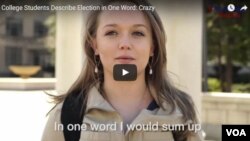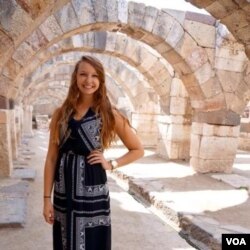Student Union
- By Pete Musto
Students Have One Word for American Elections

But students at GW aren't convinced.
VOA asked several students about how politically active they were on a scale of 1-to-10. And none of the students put themselves higher than a six on that scale.
VOA also asked the students to describe the presidential election in one word.
"Crazy."
The Princeton Review created the list of schools they say have high numbers of politically active students. The Princeton Review is an organization and publication that ranks U.S. colleges and universities each year in a book called "The Best 380 Colleges." (It is not affiliated with Princeton University, which typically ranks in the Top 3 on college-ranking lists.)
The Princeton Review surveys more than 136,000 students at 380 schools. The organization told VOA that the list of politically active schools is based on one question: "Student-run political groups have an active presence on campus."
The possible responses are "strongly disagree, disagree, neither agree or disagree, agree or strongly agree."
Regan McAllister, 19, is a first-year student of international affairs and Asian studies at George Washington University, or GW. From Niceville, Florida, but having lived internationally most of her life, McAllister says the reason politics are important at GW is the location: Washington, D.C.
"Just being right by the White House and the Capitol and everything. Our professors and the students are constantly hearing about the news. And it kind of hard not to, because it’s right where we live. ... People with interests in politics come to GW to be among it all."
McAllister first started following politics when she studied in Turkey in 2015 before coming to GW.
"There was a big election that happened in June. Leading up to that election was when I really got into it and it was mostly Turkish politics at the time. I learned a lot about it and so that just kind of carried over when I came to college."
The political activity of young people can be hard to predict. For example, college-educated young people vote differently from young people who never attend college.
Kei Kawashima-Ginsberg is the director for the Center for Information and Research on Civic Learning and Engagement, or CIRCLE, at Tufts University in Massachusetts. The organization studies the political activity of people younger than 30.
Kawashima-Ginsberg says college-educated young people are twice as likely to vote in primary elections as those with no college experience.
She says the 2008 campaign that elected President Barack Obama broke a 30-year record in numbers of young people involved. The 2012 campaign also had high numbers of young voters. But, she added, young people lately have trouble feeling connected to politics.
"We were hearing both from young people who are in college and out of college about how they perceive voting. For them, it was starting to become this old, outdated thing that has no relevance or impact. And that showed, truly, in voting statistics, where we recorded the lowest youth turnout ever in 2014."
Young people are not alone in low turnout. FairVote -- an organization that studies U.S. democracy and elections -- reported only about 36 percent of the entire voting population voted in the 2014 midterm election.
Nancy Thomas is the director of the Institute for Democracy and Education, also at Tufts University. The institute runs a project called the National Study of Learning, Voting and Engagement, or NSLVE. Researchers studied the voting habits of U.S. college students from 2012 and 2014.
Thomas says there are more college students now who are older than 30. And studies of young people produce different results than studies that only look at college students.
Student movements like the Black Lives Matter protests show college campuses are important places for political activity, she said.
Thomas adds that schools where politics are frequently discussed in class have the most politically active students. If professors use political examples in any subject, including math or history, students will see how important politics are.
Hanna Corn, 20, is a second-year student studying international affairs and political science at GW. Originally from Wilmington, New Jersey, Corn is also the membership director of the GW College Democrats.
Corn says political student groups and political discussion are everywhere at GW.
"Students would be talking about it in line to get their food at cafeterias. You’d be in the library and you’d look over at people laughing and they’d be watching a political talk show. Even at a social gathering, people are discussing politics. ... Even when you don’t want to hear about it, it will be right outside your door… So you might as well reach out and also engage in it."
Corn says she has also learned a lot about people with opinions different from her own. She frequently talks and debates with members of the GW College Republicans.
"We share an office actually , so we are constantly exchanging ideas. … It’s good to learn both sides. ... But I think it’s very difficult to be a strident conservative or Republican at our campus because the Republicans even I know are not so far to the right.
"People that are more conservative don’t speak out. … But I think that there are more of them in our campus than you realize."
VOA reached out to the GW College Republicans but received no response.
Both Thomas and Kawashima-Ginsberg agree there is an increasing number of young Republicans voting in this primary. But Thomas says young Republicans care about different issues than older party members. Older members care more about terrorism, while young members care more about government spending.
Both younger and older Democrats seem to care about the same issues, she says. But fewer young people are joining any political party at all.
Kawashima-Ginsberg points out that technology plays a major role in how young people choose to be involved.
"Social media’s played a bigger role in this age. In a way, young people are able to organize themselves online with their like-minded peers and start some action or cause… without being told what might be helpful for a candidate or what they’re supposed to do for the campaign."
Thomas says that students entering the field of education vote more than any other group. Students studying math and science vote the least. Also, African-American students vote more than white, Latino, Asian, Pacific Islander and Native American students.
See all News Updates of the Day
- By VOA News
Competition grows for international students eyeing Yale

It’s tough to gain admission to Yale University, and it’s getting even tougher for international students as standout students from around the world set their sights on Yale.
The Yale Dale News, the campus newspaper, takes a look at the situation here.
- By VOA News
Student from Ethiopia says Whitman College culture made it easy to settle in

Ruth Chane, a computer science major from Ethiopia, writes about her experiences settling into student life at Whitman College in the U.S. state of Washington.
"The community at Whitman College made sure I felt welcomed even before I stepped foot on campus," she says.
- By VOA News
Claremont Colleges student gets a shock when she heads home to Shanghai

In The Student Life, the student newspaper for the Claremont Colleges, a consortium of five liberal art colleges and two graduate schools in Claremont, California, student Rochelle Lu writes about readjusting to her Shanghai home after spending a semester in the United States.
- By VOA News
Cedarville University aims to ease transition for international students

Cedarville University in the U.S. state of Ohio says it’s got more than 140 international students representing 44 countries.
Here, the school interviews Jonathan Sutton, director of international student services. He talks about his job and the opportunities for international students on campus.
- By VOA News
Morehouse College offers prospective students tips on applying and thriving

Morehouse College, a private, historically Black liberal arts college in the U.S. state of Georgia, offers a guide for international students interested in attending the school.
Among the tips to apply and thrive at Morehouse:
- Take advantage of the school’s orientation program
- Turn to the school’s Center for Academic Success for tutoring, support and more
- Immerse yourself in campus life via clubs and societies
- By Reuters
US reviews Columbia University contracts, grants over antisemitism allegations

The administration of President Donald Trump said on Monday it will review Columbia University's federal contracts and grants over allegations of antisemitism, which it says the educational institution has shown inaction in tackling.
Rights advocates note rising antisemitism, Islamophobia and anti-Arab bias since U.S. ally Israel's devastating military assault on Gaza began after Palestinian Hamas militants' deadly October 2023 attack.
The Justice Department said a month ago it formed a task force to fight antisemitism. The U.S. Departments of Health and Education and the General Services Administration jointly made the review announcement on Monday.
"The Federal Government's Task Force to Combat Anti-Semitism is considering Stop Work Orders for $51.4 million in contracts between Columbia University and the Federal Government," the joint statement said.
The agencies said no contracting actions had been taken yet.
"The task force will also conduct a comprehensive review of the more than $5 billion in federal grant commitments to Columbia University."
The agencies did not respond to requests for comment on whether there were similar reviews over allegations of Islamophobia and anti-Arab bias.
Columbia had no immediate comment. It previously said it made efforts to tackle antisemitism.
College protests
Trump has signed an executive order to combat antisemitism and pledged to deport non-citizen college students and others who took part in pro-Palestinian protests.
Columbia was at the center of college protests in which demonstrators demanded an end to U.S. support for Israel due to the humanitarian crisis caused by Israel's assault on Gaza. There were allegations of antisemitism and Islamophobia in protests and counter-protests.
During last summer's demonstrations around the country, classes were canceled, some university administrators resigned and student protesters were suspended and arrested.
While the intensity of protests has decreased in recent months, there were some demonstrations last week in New York after the expulsion of two students at Columbia University-affiliated Barnard College and after New York Governor Kathy Hochul ordered the removal of a Palestinian studies job listing at Hunter College.
A third student at Barnard College has since been expelled, this one related to the occupation of the Hamilton Hall building at Columbia last year.
Canada’s immigration overhaul signals global shift in student migration
From Europe to North America, nations are tightening their immigration policies. Now Canada, long seen as one of the world's most welcoming nations, has introduced sweeping changes affecting international students. The reforms highlight a growing global trend toward more restrictive immigration policies. Arzouma Kompaore reports from Calgary.
Trump administration opens antisemitism inquiries at 5 colleges, including Columbia and Berkeley

The Trump administration is opening new investigations into allegations of antisemitism at five U.S. universities including Columbia and the University of California, Berkeley, the Education Department announced Monday.
It's part of President Donald Trump's promise to take a tougher stance against campus antisemitism and deal out harsher penalties than the Biden administration, which settled a flurry of cases with universities in its final weeks. It comes the same day the Justice Department announced a new task force to root out antisemitism on college campuses.
In an order signed last week, Trump called for aggressive action to fight anti-Jewish bias on campuses, including the deportation of foreign students who have participated in pro-Palestinian protests.
Along with Columbia and Berkeley, the department is now investigating the University of Minnesota, Northwestern University and Portland State University. The cases were opened using the department's power to launch its own civil rights reviews, unlike the majority of investigations, which stem from complaints.
Messages seeking comment were left with all five universities.
A statement from the Education Department criticized colleges for tolerating antisemitism after Hamas' Oct. 7, 2023, attack on Israel and a wave of pro-Palestinian protests that followed. It also criticized the Biden administration for negotiating "toothless" resolutions that failed to hold schools accountable.
"Today, the Department is putting universities, colleges, and K-12 schools on notice: this administration will not tolerate continued institutional indifference to the wellbeing of Jewish students on American campuses," said Craig Trainor, the agency's acting assistant secretary for civil rights.
The department didn't provide details about the inquiries or how it decided which schools are being targeted. Presidents of Columbia and Northwestern were among those called to testify on Capitol Hill last year as Republicans sought accountability for allegations of antisemitism. The hearings contributed to the resignation of multiple university presidents, including Columbia's Minouche Shafik.
An October report from House Republicans accused Columbia of failing to punish pro-Palestinian students who took over a campus building, and it called Northwestern's negotiations with student protesters a "stunning capitulation."
House Republicans applauded the new investigations. Representative Tim Walberg, chair of the Education and Workforce Committee, said he was "glad that we finally have an administration who is taking action to protect Jewish students."
Trump's order also calls for a full review of antisemitism complaints filed with the Education Department since Oct. 7, 2023, including pending and resolved cases from the Biden administration. It encourages the Justice Department to take action to enforce civil rights laws.
Last week's order drew backlash from civil rights groups who said it violated First Amendment rights that protect political speech.
The new task force announced Monday includes the Justice and Education departments along with Health and Human Services.
"The Department takes seriously our responsibility to eradicate this hatred wherever it is found," said Leo Terrell, assistant attorney general for civil rights. "The Task Force to Combat Anti-Semitism is the first step in giving life to President Trump's renewed commitment to ending anti-Semitism in our schools."
- By VOA News
STEM, business top subjects for international students

The Times of India breaks down the most popular subjects for international students to study in the U.S.
STEM and business lead the pack. Read the full story here. (January 2025)
- By VOA News
Safety and visa difficulties among misconceptions about US colleges

U.S. News & World report addresses some of the misconceptions about U.S. colleges and universities, including the difficulty of getting a visa.
Read the full story here. (January 2025)
- By VOA News
Work opportunities help draw international students to US schools

US News & World Report details the three top factors in foreign students' decision to study in the U.S. They include research opportunities and the reputation of U.S. degrees. Read the full story here. (December 2024)
- By VOA News
British student talks about her culture shock in Ohio

A British student who did a year abroad at Bowling Green State University in Ohio talks about adjusting to life in America in a TikTok video, Newsweek magazine reports.
Among the biggest surprises? Portion sizes, jaywalking laws and dorm room beds.
Read the full story here. (December 2024)
- By VOA News
Harvard's Chan School tells international students what to expect

Harvard's T.H. Chan School of Public Health reaches out to international students by detailing the international student experience at the school.
Learn more about housing, life in Boston and more here.
- By Reuters
China unveils plan to build 'strong education nation' by 2035

China issued its first national action plan to build a "strong education nation" by 2035, which it said would help coordinate its education development, improve efficiencies in innovation and build a "strong country."
The plan, issued Sunday by the Communist Party's central committee and the State Council, aims to establish a "high quality education system" with accessibility and quality "among the best in the world."
The announcement was made after data on Friday showed China's population fell for a third consecutive year in 2024, with the number of deaths outpacing a slight increase in births, and experts cautioning that the downturn will worsen in the coming years.
High childcare and education costs have been a key factor for many young Chinese opting out of having children, at a time when many face uncertainty over their job prospects amid sluggish economic growth.
"By 2035, an education power will be built," the official Xinhua news agency said, adding that China would explore gradually expanding the scope of free education, increase "high-quality" undergraduate enrolment, expand postgraduate education, and raise the proportion of doctoral students.
The plan aims to promote "healthy growth and all-round development of students," making sure primary and secondary school students have at least two hours of physical activity daily, to effectively control the myopia, or nearsightedness, and obesity rates.
"Popularizing" mental health education and establishing a national student mental health monitoring and early warning system would also be implemented, it said.
It also aims to narrow the gap between urban and rural areas to improve the operating conditions of small-scale rural schools and improve the care system for children with disabilities and those belonging to agricultural migrant populations.
The plan also aims to steadily increase the supply of kindergarten places and the accessibility of preschool education.
- By VOA News
A look at financial aid options for international graduate students in US

The Open Notebook, a site focusing on educating journalists who cover science, has complied a list of U.S. graduate program financial aid information for international students.







